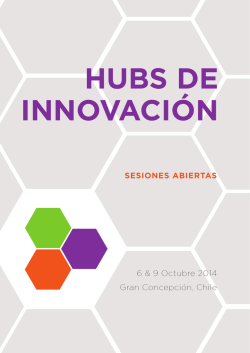
El ideal de las smart cities se hace tangible
El ideal de las smart cities se hace tangible El gran crecimiento urbano… Fuente: Future 2030 60% 80% de la población mundial vivirá en ciudades en 2030, frente al 50% en 2013 2013 2030 del crecimiento urbano en los próximos 20 años se producirá en África y Asia. 2030 50% 60% Dubai - a new paradigm smart cities - afor new paradigm 20Dubai HOY 37 en 2025 for smart cities El número de megaciudades (con una población de más de 10 millones) se incrementará de: Rapid urbanisation ... Source: Future 2030 Rapid urbanisation ... Source: Future 2030 Un edificio = dos megaciudades y la penetración digital… 360 millones Usuarios de Internet a nivel global en 2000 2.400 millones Usuarios de Internet a nivel global en 2012 75% En algunos países hay más población con acceso a un teléfono móvil que a una cuenta bancaria, a electricidad o a agua limpia. and digital penetration ... Global internet 360 million users in 2000 Global internet El valor global users in 2012 75% 75% 2012 2.4 billion 360 million La mitad de la población mundial tendrá acceso a Internet en 2030, frente al 34% en 2012. 34% de la población mundial tiene acceso a un teléfono móvil. and digital penetration ... Global internet users in 2012 Global internet users in 2000 50% 2030 50% of the global population has access to a mobile phone. 34% 2012 de 2030 In some countries, more have access to a of the digitalpeople dataphone in than to a bank mobile account, electricity or clean the world today was water. 2012 2030 90% USD151 BILLION 90% USD151 BILLION 90% The global value of the ‘app economy’ is projected to be 50% In some countries, more people have access to a mobile phone than to a bank account, electricity or clean of the global population has water. access to a mobile phone. de la ‘economía app’ se espera que alcance los 2.4 billion 151.000 MILL. DE DÓLARES en 2017. created in the last two years of the digital data in the world today was created in the last two years The global value of the ‘app economy’ is projected be BYto2017. Half of the world’s population will have access to the internet by 2030. 34% Half of the world’s Up from 34% in population will 2012. have access to the internet by datos digitales 2030. los en el mundo se Up from 34% in crearon en 2012.los últimos dos años. BY 2017. tienen efectos positivos negativos. have positive and negativeyeffects. have positive and negative effects. Transformation Cambios enof communication Increasingly Población más connected populations conectada Transportation Transformación transformations del transporte Transformation of communication Increasingly connected populations Transportation transformations Pressure to adapt to ‘locked-in’ effects of global warming Unpredictable, dramatic ecosystem impacts Energy and water demand on the rise Food and agricultural pressures Large-scale urban infrastructure needs Pressure to adapt Presión para to ‘locked-in’ effects adaptarse a of global warming Unpredictable, dramatic Impactos ecosystem impacts imprevisibles Energy and water Aumento de demand la demanda on the rise FoodPresiones and agricultural pressures alimentarias Large-scale Necesidadurban de infrastructure infraestructuras needs a gran escala comunicación los efectos del en el ecosistema calentamiento Smart city principles global Innovation as the source La innovación of sustaining growth A new future for Un nuevo manufacturing of sustaining growth A new future for manufacturing como fuente de crecimiento sostenible Innovation as the source de agua y energía Increased del consumption Aumento consumo base driving economic como base para opportunities las oportunidades económicas Increased consumption futuro en la industria y en la agricultura base driving economic opportunities Urban poverty pressures including growing populations living in informal settlements Urban povertyurbana, pressures Pobreza including growing incluyendo a populations living in población viviendo informal settlements en asentamientos informales Source: KPMG analysis - 2015 Smart city principles Adopting smart city principles addresses urbanisation challenges Source: KPMG analysis - 2015 Telecom Los principios decity las smart citiesaddresses urbanisation challenges Adopting smart principles Healthcare Tourism Telecom Los principios de las smart cities para hacer frente a los retos del desarrollo urbano: Healthcare Tourism Telecomunicaciones Technology Sanidad Capturar Turismo Technology datos Transportation arse Comunic Utilities Process Tecnología People Process People Transportation Transporte Analizar Utilities Public safety Education Procesos Utilities Personas Buildings Public safety Education Actuar Buildings Dubai’s smart city strategy Seguridad pública Educación Source: Dubai Plan 2021 Edificación Dubai’s smart city strategy Source: Dubai Plan 2021 Dubai has taken the right steps to make itself the new Factores clave del éxito paradigm for smart cities, Dubai has taken the right underpinned the three steps to makebyitself the new themes of communication, paradigm for smart cities, integration and underpinned bycooperation. the three CO OP E Critical success factors Participación del sector privado The preferred place to live, work and visit A city of happy, creative and A smart and people empowered sustainable city An inclusive and cohesive A pivotal hub society in the global economy The preferred place to live, A pioneering work and visit and excellent government A pivotal hub in the global economy A pioneering and excellent government A smart and sustainable city Liderazgo y visión Factores clave del éxito Ciclos CO M Políticas y regulación R ICA Critical success factors An inclusive and cohesive society UN R themes of communication, RA integration and cooperation. A city of happy, creative and empowered people Source: KPMG analysis - 2015 Source: KPMG analysis - 2015 Integración Innovación y agilidad INTEGRAR Dubai has all of the essential critical success factors to become the leading city, Dubai has all of thesmart essential settingcritical a new success standardfactors for other to cities tosmart emulate. become the leading city, setting a new standard for other cities to emulate. © 2015 KPMG, S.A., sociedad anónima española y miembro de la red KPMG de firmas independientes, miembros de la red KPMG, afiliadas a KPMG International Cooperative (“KPMG International”), sociedad suiza. Todos los derechos reservados. KPMG y el logotipo de KPMG son marcas registradas de KPMG International Cooperative (“KPMG International”), sociedad suiza. La información aquí contenida es de carácter general y no va dirigida a facilitar los datos o circunstancias concretas de personas o entidades. Si bien procuramos que la información que ofrecemos sea exacta y actual, no podemos garantizar que siga siéndolo en el futuro o en el momento en que se tenga acceso a la misma. Por tal motivo, cualquier iniciativa que pueda tomarse utilizando tal información como referencia, debe ir precedida de una exhaustiva verificación de su realidad y exactitud, así como del pertinente asesoramiento profesional.
© Copyright 2026

